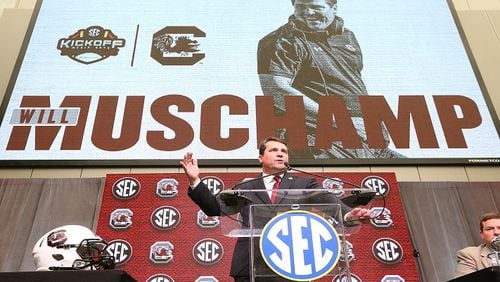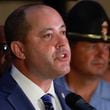Athletes and coaches have always had an interesting relationship with the media.
And like any relationship, there are highs and lows.
This is one of those low moments.
Over the weekend, South Carolina head football coach Will Muschamp and Jacksonville Jaguars cornerback Jalen Ramsey unleashed their anger on journalists for just doing their jobs.
Muschamp was upset after ESPN released an explosive report detailing the toxic culture that exists inside the University of Maryland’s football program under head coach D.J. Durkin, that may have resulted in the June death of offensive lineman Jordan McNair after a workout.
But instead of considering that the reporting of three journalists could be credible and verified, Muschamp went on an emotional rant all because he considers Durkin a friend.
“I know D.J. Durkin. He worked for me for four years at the University of Florida,” Muschamp said. “He is an outstanding football coach. But he’s also an outstanding husband and a father, and he treats people with respect.
“And I’ll use your word, alleged article. There’s no credibility in anonymous sources,” continued Muschamp. “If that former staffer had any guts, why didn’t he put his name on that? I think that’s gutless. And in any business, and in any company, and in any football team, especially right here in August, you can find a disgruntled player that’s probably not playing.
“So I think it’s a lack of journalistic integrity to print things with anonymous sources.”
The quote that Muschamp was referring to was from a former staffer at Maryland that told ESPN, “I would never, ever, ever allow my child to be coached there.”
And while I understand that this is an emotional and touchy subject for Muschamp because of his relationship with Durkin, the South Carolina coach just let us know that he doesn’t understand how journalism works, at all.
Because Deepthroat was an anonymous source that broke open Watergate. And Adrian Wojnarowski uses anonymous sources every day as the leading news breaker in sports media.
Just because a source is anonymous to the public, doesn’t mean that their information doesn’t check out, or hasn’t been investigated. Muschamp’s reaction is also the reason some sources rely on their anonymity.
Muschamp is making the same mistake Ohio State’s Urban Meyer did by automatically going into defense mode, instead of considering that someone they care about could be at fault.
“You’re talking about a serious situation here just like we are at Ohio State,” said ESPN’s Paul Finebaum on Birmingham sports talk radio show Monday morning. “Unfortunately, in this case, we’ve seen someone die. I think that makes it more complex, and the fact that Will Muschamp stood up for him is magnanimous on Will Muschamp’s part out of friendship, but I was really dumbfounded by his logic and his reasoning. Maybe it comes after me being in journalism all my life, but for him to attack anonymous sources, it’s purely being tone-deaf. That’s unfortunately or fortunately the way the business works, and presidents have been overthrown because of anonymous sources. It doesn’t make every anonymous source right, but in this case, I think Will Muschamp was ill-advised to stand up for his friend. This was the wrong time to do it.
“This was one time when attacking the process was wrong.”
That “attacking of the process” is what led to Ramsey being suspended for a week by the Jaguars for “violating team rules and conduct unbecoming of a Jaguars football player.”
When a scuffle happened at the Jaguars practice between Dante Fowler and Yannick Ngakoue, Florida Times-Union reporter Phillip Heilman did his job and filmed it.
Ramsey didn’t like that, and apparently met with some members of the media and threatened to tell his teammates to shut them out if the video was released.
Soon after the video went up, Ramsey tweeted this:
“@phillip_heilman you know you done messed up right? Lol if y’all want war, we got sum for y’all. & Iknow the rest of y’all (you know who you are) gone read this too so just know #LameAssReporters”
Feuding like this with the media usually doesn’t work out well for athletes. A few years ago former Seahawks cornerback Richard Sherman tried to get a reporter banned from Seattle’s facilities and get his media credential revoked.
It was never going to happen, and a few days later Sherman had to apologize. Ramsey will probably be doing the same soon.
The irony of it all is that no one seemed to have a problem when the Charlotte’s Observer’s Jeff Siner filmed a confrontational conversation between former Panthers teammates Cam Newton and Kelvin Benjamin just days before, as the two were “beefing” after Benjamin made some very factually inaccurate public comments about Newton’s skill level and football knowledge.
“I should’ve just been drafted by somebody else. I should’ve never went to Carolina. Truly, I just think Carolina was bad for me,” Benjamin told The Athletic. “If you would’ve put me with any other quarterback, let’s be real, you know what I’m saying? Any other accurate quarterback like (Aaron) Rodgers or Eli Manning or Big Ben (Roethlisberger) — anybody! — quarterbacks with knowledge, that know how to place a ball and give you a better chance to catch the ball. It just felt like I wasn’t in that position.”
Ramsey didn’t have a problem when that video was released, so apparently, he likes to throw stones from his glass house.
In both situations, Muschamp and Ramsey come off looking hypocritical, overly emotional, and problematic.
And while I understand that nobody wants to think the worst of a friend or a disagreement between teammates put on blast, the idea that the media is the enemy in those situations is not only flawed but irresponsible.
I’m not here to say that “the media” always gets it right, or to say that Muschamp and Ramsey may have had their reasons. However, we’re living in a time where powerful figures and intuitions across the sports, entertainment, and political landscapes are being exposed and held accountable.
Anonymous sources and videos of fights at practice aren’t the issue here, the reactions to them are.
About the Author






